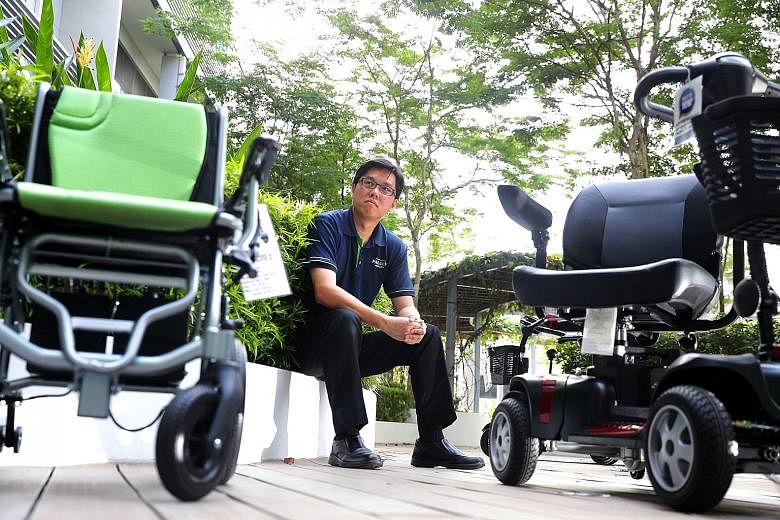The disabled community has expressed concerns that restrictions being considered for personal mobility aids (PMAs) could be onerous and cause inconvenience to handicapped and elderly users.
Retailers and an organisation have urged the Active Mobility Advisory Panel - set up in 2015 to discuss such issues - to consider the genuine needs of users and proposed lower speed limits for the devices to prevent them from being used for the wrong reasons.
It comes after panel chairman, Associate Professor Muhammad Faishal Ibrahim, posted on Facebook that some retailers have marketed non-compliant personal mobility devices (PMDs) with seats as personal mobility aids.
Dr Faishal, also Senior Parliamentary Secretary for Education and Social and Family Development, said the panel hopes to prevent able-bodied people from using the devices dangerously.
Under current rules, PMDs like electric scooters and hoverboards cannot exceed 15kmh on pedestrians-only paths. The maximum speed for PMDs on cycling and shared paths is 25kmh. They cannot be used on roads and must have a speed cap of 25kmh.
PMDs also cannot weigh over 20kg or measure wider than 70cm. Users of PMAs - such as motorised wheelchairs and mobility scooters - follow similar rules but are exempt from weight, width and speed requirements, lawyers say. PMD and PMA users who flout the rules face fines or jail.
Mr Denis Koh, a member of the 14-member panel, said there have been cases of able-bodied people modifying PMAs as well as retailers selling PMDs as PMAs.
Mr Warren Chew, managing director of Falcon Mobility, said that if weight curbs on PMDs are extended to PMAs, many legitimate PMAs sold here will become illegal. "I've heard suggestions to implement user registration or medical certification before people can buy PMAs," he said, adding that such restrictions will only impose more inconvenience and cost on users.
Ms Vanessa Keng, co-founder of e-commerce store The Golden Concepts, hopes that any new regulations will not impact elderly users who have few reliable mobility options to choose from. "It's difficult to regulate this. How do you classify and pinpoint who needs a PMA to get around?" she said.
Mr Segar Lais, 50, a technician who has used a motorised wheelchair for five years due to a spinal injury, said disabled and elderly users sometimes add weight to their PMAs through modifications to help them get on and off the PMA or ride it comfortably.
The Handicaps Welfare Association, which has over 2,000 disabled members, supports a speed limit. Its president Edmund Wan said: "Strict restrictions on modifying them or having to send them for yearly inspections will be an inconvenience."

